Japanese Gardens

Реклама. ООО «ЛитРес», ИНН: 7719571260.
Оглавление
Geeta K. Mehta. Japanese Gardens
Отрывок из книги
An engawa porch at the Ishikawa International Salon unites the interior of the house with the garden.
This view at Shisen-do includes raked sand in the foreground, clipped azaleas in the mid-ground, and large trees in the background.
.....
Gardens in the later Heian period usually included an Amitabha Buddha hall and a pond. Byodo-in in the town of Uji near Kyoto, Jyoruri in Kyoto and Motsu-ji in Hiraizumi in Iwate Prefecture are examples of this advanced style. Taoist and Onmyodo (animistic) beliefs influenced the aristocratic social life of this period, so gardens followed the theme of shijinso, the ideal composition according to Taoism where directional gods are located in appropriate places to invoke good luck. This system held that hills or mountains should be in the north, rivers should be in the east, ponds in the south, and roads in the west.
Japanese gardens do not rely on bright flowers or exotic plants for their beauty, focusing instead on the simplicity of trees, shrubs and moss.
.....